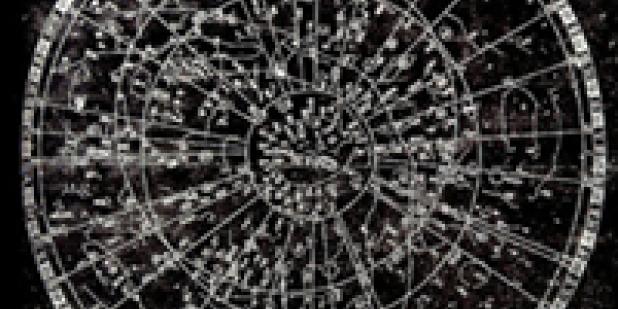Happy Lunar New Year from the USC US-China Institute!
Ancient Chinese Skies: Astronomical Expertise in Premodern China
Professor Xu Fengxian and Professor David Pankenier will give a talk on the celestial phenomena in ancient China.
Where

Morning session: A workshop for graduate students
Afternoon session: A public colloquium
Wednesday, April 30, 2008
9:00 AM - 4:00 PM
Astronomy and Prophecy in the Zuozhuan: A Workshop
9 am - 12:00
243 Royce Hall
Open to students (and others by permission). Please contact Professor David Schaberg schaberg@humnet.ucla.edu
Stargazing through the Centuries
1:30 pm - 4:30 pm
10383 Bunche Hall
Open to the public
Changing Perspectives on Anomalous
Celestial Phenomena in Ancient China
XU FENGXIAN
Institute for the History of Natural Science, Chinese Academy of Sciences
(xu@ihns.ac.cn)
Visiting Postdoctoral Research Scholar, Lehigh University, 2007-08
(fex307@lehigh.edu)
In ancient China, the dominant view of anomalous celestial events was that they were a response to human affairs. Thus they could have widespread social consequences. In order to compare these effects at different times, this lecture divides the span from Han dynasty to the end of the Qing dynasty into eleven periods. By analyzing the timing and contents of imperial edicts concerning anomalous celestial phenomena in each period, and taking into account the historical background, Professor Xu finds that it was the Han dynasty that attached the greatest importance to such events. This interest declined markedly from the Wei to the Sui dynasties. It began to rise again in the Tang dynasty, reaching a second peak in the Song dynasty, and then decreased again from the Yuan dynasty to the Qing dynasty.
Xu Fengxian is Professor in the Institute for the History of Natural Science, Chinese Academy of Sciences, and a Visiting Postdoctoral Research Scholar at Lehigh University. Professor Xu has been conducting research on the history of Chinese astronomy since 1991. She earned her Ph.D. in the history of science in 1994. She participated in the five-year Xia-Shang-Zhou Chronology Project and was responsible for analyzing the calendrical records on oracle bone inscriptions and the reign years of the last two kings of the Shang dynasty. Among Professor Xu's publications is ?????????? (A study of correspondences between the late Shang sacrificial cycle and the calendar; 2006).
Bringing Heaven Down to Earth in Ancient China
DAVID W. PANKENIER
Lehigh University
(dwp0@lehigh.edu)
Study of the cosmological significance of the North Pole in ancient Chinese thought suggests that ritual specialists in Bronze Age China, like their earlier counterparts in ancient Egypt, used the circumpolar stars to find true north, a task complicated during the last two millennia BCE by the absence of a comparatively bright star near the pole. Similarly, archaeological discoveries from the Xia, Shang, and Zhou periods show that it had become crucially important to achieve a cardinal orientation of the built environment--walls, palaces, temples, tombs, common burials, and even storage pits give evidence of a preoccupation with N-S axial alignment. It has long been understood that cardinality is an index of the paradigmatic roles of zhong ? “the center” and si fang ?? “the four quarters,” both core organizing principles of early Chinese cosmological thinking. Here, however, our concern will be less with cosmological perspectives than with how, in practical terms, cardinal orientation was achieved in the early period and what this tells us about a fundamental mindset that figured importantly in the formation of early Chinese civilization.
David W. Pankenier is Professor Modern Languages & Literatures at Lehigh University. An intellectual historian by inclination, his formal studies in sinology, begun at the University of Stockholm, Sweden, and completed at Stanford University, were augmented by three years of private tutoring in the Confucian classics in Taiwan by Aisin-Gioro Yü-yün. He is best known for his work focusing on the role of astronomy and astrology in ancient Chinese history, including the discovery of accounts of rare planetary events which signaled the conferral of Heaven’s Mandate in conjunction with dynastic transitions in Bronze Age China. His current research interests range from cultural astronomy, to the history of ideas in China, to contemporary Chinese affairs. Among his publications are East Asian Archaeoastronomy: Historical Records of Astronomical Observations of China, Japan, and Korea, vol. 2. David W. Pankenier, Zhentao Xu, and Yaotiao Jiang (forthcoming); and East Asian Archaeoastronomy: Historical Records of Astronomical Observations of China, Japan and Korea, Zhentao Xu, David W. Pankenier, and Yaotiao Jiang (2000).
Featured Articles
We note the passing of many prominent individuals who played some role in U.S.-China affairs, whether in politics, economics or in helping people in one place understand the other.
Events
Ying Zhu looks at new developments for Chinese and global streaming services.
David Zweig examines China's talent recruitment efforts, particularly towards those scientists and engineers who left China for further study. U.S. universities, labs and companies have long brought in talent from China. Are such people still welcome?






